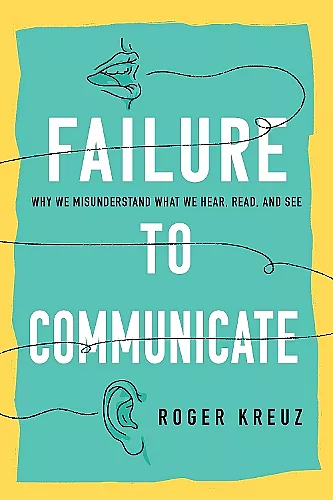Failure to Communicate
Why We Misunderstand What We Hear, Read, and See
Format:Hardback
Publisher:Prometheus Books
Published:10th Apr '23
Currently unavailable, our supplier has not provided us a restock date

“Why didn’t they understand me? I was as clear as I could be.” Everyone has had this thought at one time or another. Research from the fields of psychology and cognitive science can provide concrete answers to these questions. In Failing to Communicate, Dr. Roger Kreuz explores the answers to these questions
We are exposed to the dangers of miscommunication early in life. As children, we play the Telephone Game and learn an important lesson about the fragility of long communication chains. And as adults, we are constantly on the lookout for misunderstanding. People interrupt each other, on average, about every ninety seconds in order to check their understanding. Despite such vigilance, however, a great deal of what is said and written is not understood as intended.
Miscommunication has led to military defeats, the loss of spacecraft, and even more tragically, accidents that cost human lives. It plays a role in road rage and social media feuds. It haunts the courtroom, the boardroom, and the singles bar. Failing to Communicate includes dozens of such examples and explains them in light of what researchers have discovered about how communication works—and why it so often fails.
Research from psychology and cognitive science has revealed a host of specific factors that contribute to misunderstanding. Some of these have to do with how our minds make sense of what we hear and read, while others are the result of cognitive, social, and cultural factors. The very structure of a given language can be problematic as well. In short, there is no one reason for miscommunication: there are a host of underlying causes.
Issues of misunderstanding have only multiplied as new mediums for communication have arisen. Emails, texts, and social media posts are even more problematic because they are impoverished modes of communication. Without facial cues, tone of voice, gestures, and even the creative use of silence, our intentions in these text-only mediums are even more likely to go awry.
Failing to Communicate is intended to appeal, from beginning to end, to the general reader who wants to know more about why our attempts at communication fail so often
In this engaging and comprehensive new book Professor Kreuz shares the cognitive science of miscommunication and its relevance for our everyday interactions. The result is useful, thought-provoking, and also entertaining. A must-read for anyone interested in understanding why we so often misunderstand.
—Penny M. Pexman, University of Calgary
With vivid anecdotes and erudite illustrations and through accessible and compelling psychological explanations, Kreuz masterfully demonstrates how human communication can be both robust as well as brittle.
—Morton Ann Gernsbacher, University of Wisconsin-Madison
The book presents a fascinating parade of examples of miscommunications and their causes. Kreuz is a brilliant storyteller and manages to relate the results of psychological experiments in an engaging and interesting way. Ironically enough, for a book on miscommunication, he is clear and completely understandable all the way.
—Salvatore Attardo, Texas A&M University-Commerce
ISBN: 9781633888890
Dimensions: 231mm x 164mm x 23mm
Weight: 553g
296 pages